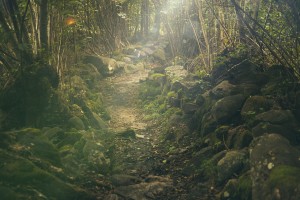Language has been a hot topic in Quebec (where I was born and raised) for as long as I can remember. I’ve had ample time and opportunity to mull over ever aspect of language as an element of culture and connection (or disconnection). Unfortunately I think far too much attention is paid to the ways in which languages divide us rather than the incredible potential they have to bring us together! What if rather than seeing language “barriers” we saw language opportunities? What if we understood language as a portal into an entire new perspective, an entirely different vision of the world? What if learning languages was a way for us to experience even more deeply the reality that surrounds us, as I truly believe it is?

The Way We See The World
Last week I watched an excellent new documentary called “L’Empreinte” (roughly translated, “the imprint” ). In it, interviewer (actor, ecologist…)Roy Dupuis asks Innu poet Josephine Bacon how their interview would be different if he spoke her language. She replies laughing (in French) “Well, for one thing, we wouldn’t need to talk so much!” and then goes on to explain how when people share a language they understand certain things, they share a certain basic worldview that doesn’t need to be spoken about. This little snippet of conversation sums up perfectly my reflections on the importance of language.
In many places such as India or Europe, where multiple recognized language groups still exist within close geographical distance of each other, it’s not uncommon for people to speak three or four languages fluently, plus various dialects. This was also the case in precolonial “North America,” or Turtle Island, as it is also known. From a purely practical level, knowing these languages was essential to trade and harmony between neighboring peoples. Perhaps this is why it’s becoming harder for us to assert the value of learning multiple languages…trade is no longer a local affair and business nowadays is conducted in one or two major languages, English usually being one of them. We don’t always take into consideration the wealth of cultural wisdom, history and insight that we lose by closing our minds to other languages.

Re-Evaluating Our Values!
I feel that the aspects of division that have built up around languages around the globe is generally the result of societies and individuals that have learned to undervalue language diversity through the influence of colonial and capitalist mindsets that see less-used languages as either “useless” or threatening to the “dominant” culture. Because of this mindset many cultural groups, including the francophone population of Quebec, end up in a reactionary and defensive mode in order to ensure their cultural survival. It is indeed all too easy for languages and traditions to be lost in the onslaught of majority English-speaking media that pervades our homes and societies.
Interestingly enough, much of the English speaking population of Quebec, themselves a minority within a minority, has as a result also gone into a type of defensive mode because of feeling threatened with cultural oppression and extinction. Within that we have a number of First Nations peoples and languages that are for the most part completely ignored in the dialogue about ongoing struggles around language and culture issues here.
There are hints that this dynamic is shifting, that we are slowly beginning to create dialogue around these issues and remove the age-old blinders that have kept us separate so long. All the better! While I use Quebec as an example I am familiar with, these types of dynamics exist worldwide. It is up to us to re-evaluate the way we value language and culture if we want to preserve some of the incredible wealth and wisdom that comes along with maintaining global diversity!

The Body – Land- Language Connection
There are soooo many elements of this worth discussing and questioning! First off, there is the reality that human beings and their languages develop according to their environments and the landscapes they are embedded in. A common example of this is the fact that people in northern countries often have way more words for different types of ice and snow then people living in less frigid geographies. So! If languages develop essentially as an extension of the land they are spoken on, doesn’t it make sense that learning the languages that evolved there would give us a much deeper level of connection to place? It sure makes sense to me!
Secondly, most people these days are of mixed heritage. I would even go so far as to say we all are, only some of us in a much less distant past. If we follow the logic of languages evolving within the context of specific types of geography, then we can also reflect on the fact that our bodies also are the result of centuries of other bodies evolving in specific landscapes! Think about it. The places where your parents and grandparents grew up take on a much greater significance when we take into account how we are effected by them, as do the languages of our ancestors. What better way to deepen our connection and understanding of personal and collective legacies—the cultural fabric of our families and “tribes” if you will – than by learning the languages (and thereby learning the landscapes and the worldviews) of the places we come from and the places we live in?

On The Road to Peace
We need to completely re-frame the way we value key cultural elements like language. Especially those of us coming from widely spoken language groups! It’s too easy to believe in the narrative of “why learn a language if you can get by in English everywhere?” There is so much more to speaking multiple languages than basic-level communication! Aside from everything else I’ve mentioned, there is the element of respect. Even if you only pick up a couple of words of another language here and there, it can provide a direct connection with someones heart to have the value of their culture recognized in such a way! Respecting “the other” is a huge piece on the road to peace…if you’ll forgive the pun. I could go on and on about this. I truly believe that if we let go of our historical training that tells us that learning less dominant language groups are useless (not to mention our fear-of-failure-based refusal to attempt learning them…) the whole world will benefit!
More and more people are realizing the incredible power and beauty of language. More and more people are delving into their personal histories and the stories of the land they live on and realizing…there is an entire world of wisdom and magic out there that we can’t even begin to imagine! If this perspective inspires you, I strongly encourage you to find a language that calls to and start learning it, bit by bit! It’s never a waste of time, no matter what you do with it. Delving into the most basic level of another language can open so many doors and will change the way you perceive the world! It’s never too late to start…